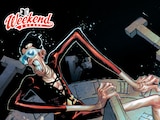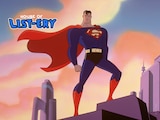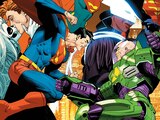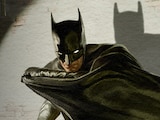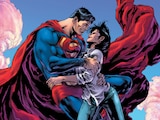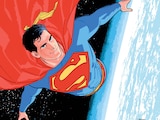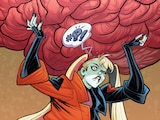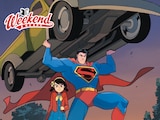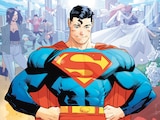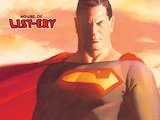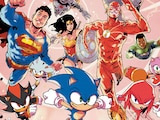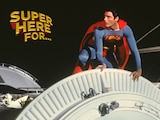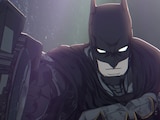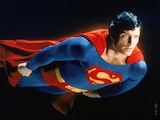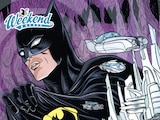One of today's leading storytellers in any medium, Grant Morrison has broken new ground with each DC comic he's written, from ANIMAL MAN, ARKHAM ASYLUM, and DOOM PATROL straight on through to JLA, ALL-STAR SUPERMAN, and his epic run on BATMAN. His first solo book featuring the Amazon Princess, WONDER WOMAN: EARTH ONE, illustrated by Yanick Paquette, was a New York Times Bestseller upon its release in 2016; and this month sees the release of the second volume in what Morrison says will be a trilogy. We caught up with the scribe to find out more about this latest work. Here's what he had to tell us...

On his own favorite Wonder Woman comics...
My favorite stories are the really weird ones, and we’ll start to bring in some elements of those in the second one. We constantly introduce these new races, Queen Desira and Aphrodite’s world, and these races of super women who are constantly fighting off bizarre male-driven societies. was very much a fantasy book. It was very strange, magical. They would go anywhere. There were kangaroos that could jump across light years. Space kangaroos! Honestly, that’s right up my alley. So, nothing beats that for me. I don’t think there’s any other era of Wonder Woman that appeals to me in the same way as those stories, because I think they just capture the essential oddness of it.
On the book's interpretation of Wonder Woman...
I wasn’t so much trying to be timely. It was about trying to honor William Marston’s original version and thinking, "Okay, what would this be like?"
The Earth-One books are very much set in a contemporary, believable world, and it was the simplicity about what would happen if Marston’s ideas were taken seriously. Those are very strange ideas. You put them in the context of today’s politics, and gender politics, the whole thing that we’re dealing with, and they become quite provocative and quite extreme and strange. It was just to follow his lead, and to show the Amazons the way he showed them, which was, yes, a separatist race of technologically advanced super women. But they’re quite happy to use mind control on their enemies. They’re quite happy with that. Their idea of weapons of peace is to just control you and tell you what’s right. They don’t use bombs. They don’t use the traditional weapons that we’ve seen Amazons use in the past. They will control your mind. Right now, that’s a really interesting thing to explore. To see a society like that, which is very powerful, come up against a contemporary world and current politics and current affairs is incendiary to a certain degree.

On the book's version of Doctor Psycho as a pickup artist...
The original Doctor Psycho was a hypnotist, a mesmerist, very much akin to the 1940s idea of the creepy hypnotist—the eyes would go blank and you would do as he said. He was very obviously a villain in those stories, this dwarfish, really creepy-looking character that you could not mistake for anything other than a bad guy.
We thought, "What’s the contemporary, modern version of that?"
So, I was looking towards the pickup artist community, and that stuff from Neil Strauss's book, The Game: Penetrating the Secret Society of Pickup Artists. A good friend of mine actually studied under Neil Strauss to learn all his techniques, so she could detect them when they were used against her. She became the world’s foremost female pickup artist.
So, we really went deep. The Doctor Psycho sequence where he sits and talks to Diana is actually based on the script used by pickup artists. Even the movements he makes, all the gestures—he makes these casting-off gestures every time he talks about something that you won’t have to perceive as negative—it was really tightly worked out to follow. They use scripts.
It’s a very strange thing , "I could weaponize this?" I liked the idea of taking that and Diana’s culture and her acceptance of mind control, to turn that against her, and to get under her defenses. Because she has a cultural willingness to accept that type of control.

On the motivation for addressing mind control...
Part of it was my revenge in having seen that done to someone I really cared about, to see the narcissist type, the sociopath type, and how easy it is for them to work people. People we wouldn’t even imagine could be that manipulated. I wanted revenge. I wanted to kick their ass a little bit. The only place I can do that is in fiction.
But I saw it as a very real problem for young women in the world. There are people out there who are quite willing to use these techniques and to mess with people’s minds. So, I kind of wanted to draw attention to it... To put this paragon of femininity and see, how does she deal with this? Because even paragons of intelligence and grace have real trouble with people like this. So, I kind of wanted to say, "Here are the techniques. If you see someone using any of these techniques against you, a warning should go off."
Wonder Woman is an avatar of truth in a world where truth has become impossible to detect. It’s getting harder and harder. Videos can be fake. Words can be fake. People can do something right in front of you and then deny it... I think we’re all being mind-controlled to a certain degree by all kinds of forces.
On the inclusion of Maxwell Lord...
He has, obviously, a very important role in the history of Wonder Woman. Back in the day, Wonder Woman very famously snapped Maxwell Lord’s neck, and it was one of the first things she did when she became the warrior version of Wonder Woman rather than the peace-giving version of Wonder Woman. So, it seemed a significant moment, and I wanted to kind of set up a certain expectation of how she is going to deal with Maxwell Lord... I kind of want to set up book 3 with Maxwell Lord, and to bring us to that moment where she has the opportunity to snap his neck again. We’ll see what happens this time.

On Wonder Woman: Earth One's Steve Trevor...
One of the things in Volume 2 is that we wanted to isolate Diana from her friends. There’s some great supporting characters, but they don’t get much of a look here, because I wanted her to feel like she wasn’t quite fitting in... So, we kind of separate off her friends. We don’t need to do Steve Trevor as a romantic interest. I loved the idea of just Steve Trevor as her best friend. There’ll be more revelations. Book 3 is a lot more about Steve, and who he is, and what his actual relationships were. So, we have to wait and see that. It’s more that this guy looks out for her, he cares about her. He’s like when you have a really good best friend that doesn’t have to be your sexual partner.
On Volume 2's cliffhanger...
I’ve already started on 3. Part of that was because, when we did the first one, it may have been the ONLY one. We hadn’t worked out the trilogy aspect of this yet. I thought at the time that maybe this would be my one shot at Wonder Woman. So, it’s quite complete in a certain way. But for the second one, we thought, "Yeah, we can really do The Empire Strikes Back."
This is obviously the second part of a trilogy. This is the part where the good guys go up against something that really tests their values and tests everything they stand for. And it ends on a note of slight defeat. She’s defeated, to a certain extent, and that rallies her into the next one, which obviously is a triumphant and victorious book. Yeah, once we realized it was a trilogy, we felt much more comfortable about the cliffhanger, about people being aware that there will definitely be a third volume. It even says, "To be continued."

On the book's Paula von Gunther...
I thought there’s a sadness to that character. In the original comics, Paula von Gunther, she’s classic Nazi super spy. She has a bunch of girls that do her bidding. But in the end, she willingly submits to the Amazons, and she’s taken, and she’s seen as a kind of success story for the Amazons because they managed to reprogram her.
So, we played with that again... It was that idea of, "Let’s see what happens when the Amazons actually apply the technology, and to see her being broken down."
I find it quite horrific almost when you see the Amazons reducing her and taking away her sense of self. It’s kind of scary. So, I felt sorry for the character. This is a woman who’s just been controlled by everyone. And for Diana to show compassion, and not to beat her into the ground, and to actually say, "We’ll make this better," even after what she does in the book, which is a fairly horrific act... I wanted to redeem her. I love the original story of redemption, but to try and see that in a more ambiguous way.
WONDER WOMAN: EARTH ONE VOL. 2 by Grant Morrison, Yanick Paquette and Nathan Fairbairn is available in comic shops on October 3 and in bookstores and digital retailers on October 9.
A version of this article originally ran on DC Universe. Be sure to subscribe to DC Universe for additional DC news and announcements, plus original and classic DC TV shows, movies, comics and more!

